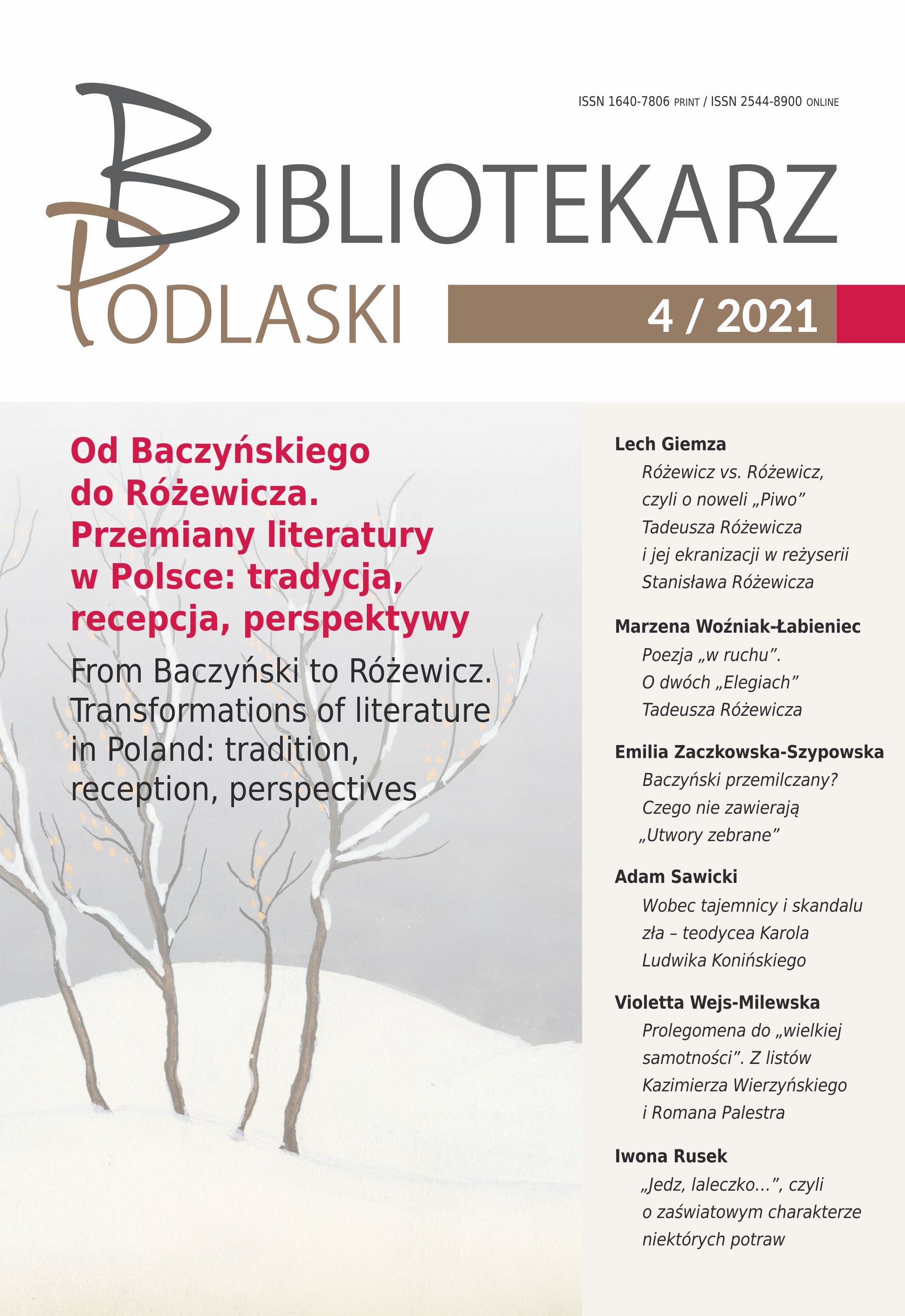Abstract
Travels were an important part of Jarosław Iwaszkiewicz’s life. One of the destinations he chose was the Soviet Union. These trips were usually of an official character, and less often – private. The writer meticulously noted down his impressions in his private Dzienniki [Diaries], and sometimes shared them with the Polish reader in columns and newspaper articles. The author of Panny z Wilka [The Maids from Wilko] masterfully immortalised the realities prevailing in the Soviet Union. Iwaszkiewicz’s view of Russia, and St Petersburg in particular, is not the account of an ordinary tourist, because the writer perceived the world through the prism of literature, constantly confronting reality with literary images. This makes Dzienniki extremely interesting material for analysis. This article takes a journey across Russia, in the footsteps of Iwaszkiewicz, focuses on literary allusions, admiration of nature and architecture, and pays special attention to the absurdities of the communist state.
References
Baranow A., Dzienniki Jarosława Iwaszkiewicza a poszczególne aspekty nowoczesnej komparatystyki, [w:] Kalba ir kontekstai VI (1) tomas 2 dalis, Vilnius 2014, s. 20–31.
Bielniak N., Rossica w listach Jarosława Iwaszkiewicza do żony z lat 1922–1926, [w:] "Acta Polono-Ruthenica" XXXIV/4, 2019, s. 103–114.
Choriew W. A., Wosprijatie Rossiji i russkoj literatury polskimi pisatieliami, Moskwa 2012.
Cybienko Je. Z., Iz istorii polsko-russkich literaturnych swiaziej XIX-XX ww., Moskwa 1978.
Czechow A. P., Połnoje sobranie soczinienij i pisiem: w 30 t. Piśma: w 12 t., Moskwa 1974–1983, T. 1, Pisma: 1875–1886, Moskwa 1974.
Drobniak P., Jedność w różnorodności. Europa w twórczości Jarosława Iwaszkiewicza, Wrocław 2002.
Faryno Je., Wwiedienie w literaturowiedienie, Sankt-Pietierburg 2004.
Gonczarow I. A., Obryw, Chudożiestwiennaja Literatura, Moskwa 1980.
Iwaszkiewicz J., Dzienniki 1911–1955, Warszawa 2007.
Iwaszkiewicz J., Dzienniki 1956–1963, Warszawa 2010.
Iwaszkiewicz J., Dzienniki 1964–1980, Warszawa 2011.
Iwaszkiewicz J., Książka moich wspomnień, Wydawnictwo literackie, Kraków-Wrocław 1968.
Iwaszkiewicz J., Książka o Sycylii, Kraków–Budapeszt–Syrakuzy 2020.
Iwaszkiewicz J., Ludzie i książki, Warszawa 1971.
Iwaszkiewicz J., Podróże do Polski, Poznań 2013.
Iwaszkiewicz J., Rachunki włóczęgi, Warszawa 2016.
Iwaszkiewicz J., Spacer po Dnieprze, „Twórczość” 1958, nr 9, s. 161.
Kopka A., Pytanie o gościnność w filozofii Jacques’a Derridy, „Folia Philosophica” 2014, T. 32, s. 319–335.
Kozicka D., Dwudziestowieczne „podróże intelektualne”. (Między esejem a autobiografią), „Teksty Drugie” 2003, nr 2–3, s. 54.
Krzeczkowski H., Recenzja Rachunków włóczęgi, „Express Wieczorny” 1957, nr 3.
Ławski J., Zygmunt Gloger: prowincja jako centrum świata, „Bibliotekarz Podlaski” 2015, T. 31, nr 2, s. 25–39.
Malinowskij A. T., Żanrowyje osobiennosti romana Gonczarowa „Obryw”, [w:] Problemy syczasnogo literaturoznawstwa. Zbirnyk naukowych prac, wyp. 4., Odesa 1999, s. 145–156.
Narodnaja encykłopedia „Mój gorod”, hasło: Saratow, URL: http://www.mojgorod.ru/saratov_obl/saratov/index.html [dostęp: 01.06.2021].
Radziwon M., Iwaszkiewicz. Pisarz po katastrofie, T. 1, Warszawa 2010.
Rapow M. A., Kamiennyje skazy, Jarosławl 1972.
Rybicka E., Od poetyki miejsca do polityki przestrzeni. Zwrot topograficzny w badaniach literackich, „Teksty Drugie” 2008, nr 4, s. 35–36.
Słownik rodzajów i gatunków literackich, red. G. Gazda, Warszawa 2012.
Sobol E., Jarosław Iwaszkiewicz i literatura rosyjska, Toruń 2014.
Toporow W., Petersburg i tekst petersburski. Wprowadzenie do tematu, „Pamiętnik Literacki” 1991, z. 2(82), s. 248.
Toporow W. N., Mif. Rituał. Simwoł. Obraz. Issliedowanija w obłasti mifopoeticzeskogo, Moskwa 1995.
Toporow W. N., Pietierburgskij tekst russkoj litieratury. Izbrannyje trudy, SanktPietierburg 2003.
Wospominanija o Jarosławie Iwaszkiewicze, sost. W. M. Borisow, Moskwa 1987.
Zaworska H., Z Polski – do Polski, „Twórczość” 1978, nr 7.
Zenkin S. N., Gostiepriimstwo: k antropologiczeskomu i literaturnomu opriedielieniju, [w:] Tradicionnyje i sowriemiennyje modeli gostiepriimstwa. Matieriały rossijsko-francuzskoj konfieriencii, Moskwa 2004, s. 165–183.
Articles published in the “gold open access” mode on the basis of a non-exclusive license agreement between the publisher and the author. Permitted use:
- the publication may be read and stored on any device,
- the publication may be cited (with obligatory reference to the author, the title of the text, as well as the full title, bibliographic address of the issue and page of the journal)
The editorial team of “Bibliotekarz Podlaski” implements an open access policy by publishing materials in the form of the so-called Gold Open Access. From volume 42 (issue 1/2019), the journal is available under the Creative Commons license (Attribution – ShareAlike: CC BY-SA).
The key declarations of the Open Access and Open Science movement, which we fully support, are available on the CEON Open Science website.
COPYRIGHT:
The editorial team of “Bibliotekarz Podlaski” implements an open access policy by publishing materials in the form of the so-called Gold Open Access. The journal is available under the Creative Commons license – Attribution – ShareAlike 4.0: International: CC BY-SA 4.0).
The key declarations of the Open Access and Open Science movement, which we fully support, are available on the CEON Open Science website.
“Bibliotekarz Podlaski” allows its readers to read, download, copy, distribute, print, search and link to the full content of articles. We enable full, immediate, unlimited (both in a territorial, temporal and technical sense) open access to all published content, in accordance with the principle that freely available research increases and accelerates the global development of science and the exchange of knowledge.
The editorial team of “Bibliotekarz Podlaski” encourages authors to place articles published in the journal in open repositories (after the review or the final version of the publisher), provided that a link to the journal’s website is provided.
The journal does not charge the authors any fees for accepting and publishing their texts.


